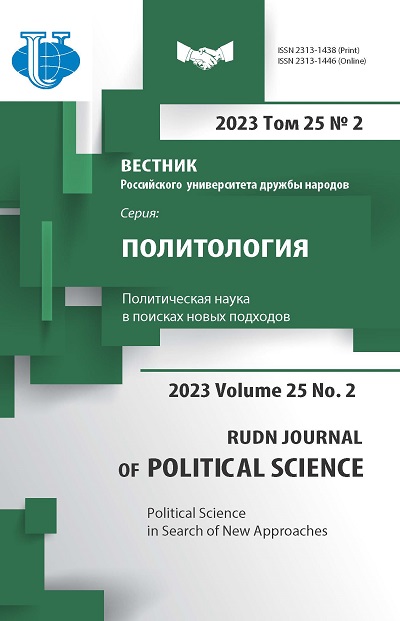«Свой среди чужих»: GR-менеджмент как политическое управление в арсенале «неполитических» агентов
- Авторы: Дегтярёв А.А.1
-
Учреждения:
- Московский государственный институт международных отношений МИД России
- Выпуск: Том 25, № 2 (2023): Политическая наука в поисках новых подходов
- Страницы: 348-367
- Раздел: ПОЛИТИЧЕСКИЕ ФЕНОМЕНЫ И СТРАТЕГИИ
- URL: https://journal-vniispk.ru/2313-1438/article/view/322230
- DOI: https://doi.org/10.22363/2313-1438-2023-25-2-348-367
- EDN: https://elibrary.ru/YYYTLQ
- ID: 322230
Цитировать
Полный текст
Аннотация
Рассматриваемая тема до сих пор находится в орбите отечественной дискуссии политологов и специалистов по Government Relations (GR). И среди них пока нет согласия относительно предметного поля изучаемой дисциплины. Мнения расходятся, относя GR к прикладной политологии, социологии коммуникаций или же к корпоративному менеджменту. В исследовании дан анализ проблем определения предмета GR-менеджмента как прикладной политологической дисциплины, а также ее категориального аппарата. Особенность GR как вида политического менеджмента состоит в том, что блок целеполагания деятельности GR-менеджеров и корпоративных лоббистов находится во «внутренней» и «неполитической» среде (экономической, социальной и др.), которая может быть связана с поддержанием конкурентоспособности фирмы и получением ею экономической прибыли. А вот средства достижения данных целей расположены уже во внешней социально-политической среде, в которой формируется поле для политического поведения заинтересованных акторов. И здесь мы сталкиваемся с феноменом инверсии представляемых в публичной политике партикулярных интересов, когда для их продвижения необходимо конвертировать цели экономической стратегии в адекватные частные вопросы при построении общей государственной повестки и в конкретные задачи стратегии и тактики уже отдельной GR-кампании.
Об авторах
Андрей Алексеевич Дегтярёв
Московский государственный институт международных отношений МИД России
Автор, ответственный за переписку.
Email: andrew.a.degtyarev@gmail.com
ORCID iD: 0000-0001-8167-2092
кандидат философских наук, доцент кафедры политической теории
Москва, Российская ФедерацияСписок литературы
- Achkasova, V.A., Mintusov, I.E. & Filatova, O.G. (Eds.). (2021). GR and lobbyism: Theories and Technologies. Moscow: Urait Publishers. (In Russian).
- Almond, G. & Powel, B. (Eds.) (2010). Comparative politics today: A world view (9th ed.) Longman.
- Avnonomov, A.S. (2004). Azbuka of Lobbying. Moscow: Prava Cheloveka. (In Russian).
- Baron, D. (2013). Business and its environment. Boston: Pearson Education.
- Coen, D., Grant, W. & Wilson, G. (2010). Political science: perspectives on business and government. In Coen D., Grant W. & G. Wilson (Eds.). The Oxford handbook of business and government. (pp. 9–34). Oxford: Oxford University Press.
- Craig, S. (2009). Political science and political management In D. Johnson. (Ed.). Routledge Handbook of Political Management (pp. 42–56). New York: Routledge.
- De Fouloy, C. (2011). Fouloy’s Explanatory lobbying dictionary. Vilnus: AALEP Publishig Division.
- Degtyarev, A.A, (1998). Foundations of Political Theory. Moscow: Vyshaya Shkola. (In Russian).
- Degtyarev, A.A, Teteryuk, A.S. & Bondarev, M.D. (2018). Cyclical dynamics of the “external’ and “internal” environments of business organizations in GR-management. MGIMO Review of International Relations, 58(1), 63–93. (In Russian). https://doi.org/10.24833/2071-8160-2018-1-58-63-93
- Degtyarev, A.A. (2018). Contemporary GR-management as intersectoral governance area. In Ilyichyova, L.E. & V.S. Komarovskyi (Eds.). Subject-Matter Field of Economic Politology. (pp. 170–180). Moscow: Publishing House “Aspect-Press” (In Russian).
- Degtyarev, A.A. (2021). Complex modeling problem of “macro-micro conversion” transformation processes in socio-political actor’s behavior and “sphere inversion” activity of politicaleconomic organizations in сontemporary GR-analytics. In L.V. Smorgunov (Ed.), Russia and political order in the changing world: Values, institutions and perspectives (pp. 21–23). Moscow: MGIMO (In Russian).
- Lerbinger, O. (2006). Corporate public affairs: Interacting with interest groups, media and government. Mahwah: Lawrence Erlbaum Associates.
- Mack, C. (1997). Business, Politics and the Practice of Government Relations. Westport: Quorum Books.
- Mahon, J. (2017). Corporate issues management. In P. Harris & C. Fleisher (Eds.), The SAGE Handbook of international corporate and public affairs (pp. 534–549). London: SAGE.
- Markovskaya, E.I. (Ed.). (2017). GR: Interaction of business and power institutions. Moscow: Youright Publishers. (In Russian).
- Molchanova, O.P. (2016). Strategic management of non-commercial organizations. Moscow: Urait Publishers. (In Russian).
- Oberman, W. (2017). Lobbying resources and strategies. In P. Harris & C. Fleisher (Eds.), The SAGE Handbook of international corporate and public affairs (pp. 483–497). London: SAGE, 2017. London: SAGE.
- Peregudov, S.P. (2000). Big Russian corporation as socio-political institute (conceptual and applied study experience). Moscow: IMEMO, 2000. (In Russian).
- Peregudov, S.P. (2006). Russian corporation as public policy agent. Moscow: GU VShA Publishing House. (In Russian).
- Salorio, E., Boddewin, J., & Dahan, N. (2006). Integrating business political behavior with economic and organizational strategies. International Studies of Management and Organization, 35(2), 28–35.
- Solovyov, A.I., & Kupryashin, G.L. (2012). Public management: Theory and technologies. Moscow: MSU. (In Russian).
- Teteryuk, A.S. (2017). Experience of development of the model of structuring environment in the process of GR-management (as exemplified by pharmaceutical branch). Society and Power, 63(1), 87–94. (In Russian).
- Vikhanskiy, O.S. (1998). Strategic management. Moscow: Gardariky. (In Russian).
- Zinovyev, A.L., Morozov, S.A. & Morozova, E.V. (2003). Political management. Krasnodar: Kuban State University (In Russian).
Дополнительные файлы








